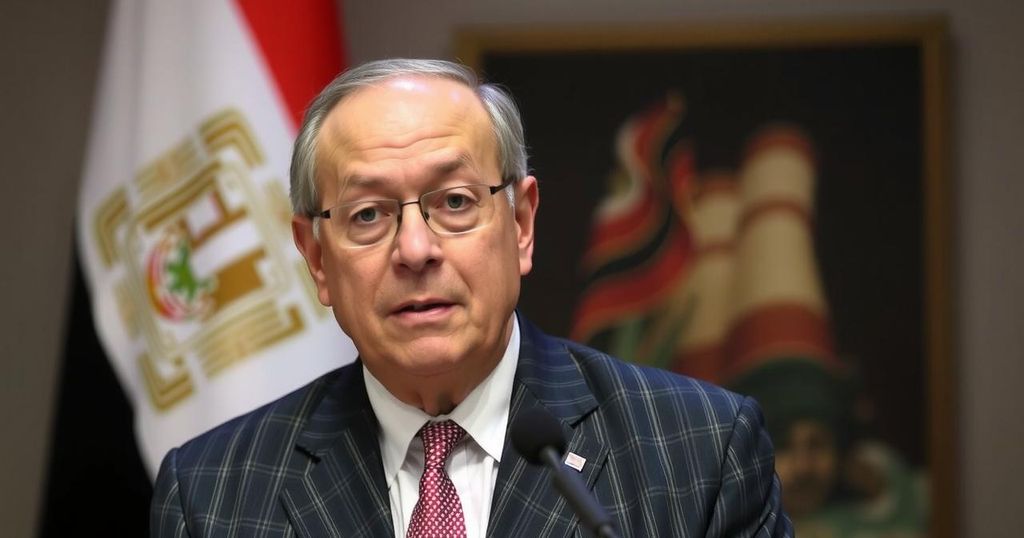Postponement of Egypt’s FM Syria Visit Raises Questions Amid Anti-HTS Campaign

Egypt’s Foreign Minister Badr Abdelatty has postponed his visit to Syria amid a robust media campaign characterizing HTS as a terrorist organization. This decision raises concerns about Egypt’s foreign policy following a recent diplomatic exchange with Syria’s transitional government. Historical hostilities and current media narratives illustrate the complexities of Egyptian-Syrian relations, particularly in the context of Islamist politics.
The Egyptian Foreign Minister, Badr Abdelatty, has postponed his forthcoming visit to Damascus, which was initially slated for next week, in light of ongoing media hostility targeting Hayat Tahrir al-Sham (HTS). This decision is particularly noteworthy amid an escalating media campaign in Egypt that has branded HTS and its leader, Ahmed al-Sharaa, as terrorist entities. Consequently, this has raised speculation regarding the Egyptian government’s position on Syria following a recent phone call between Abdelatty and the transitional government’s foreign minister, Asaad Al-Shibani.
For several weeks, the Egyptian state-controlled media, particularly those intertwined with United Media Services, have conducted a concerted effort to discredit HTS, consistently depicting the organization as a terrorist faction. This media portrayal starkly contrasts the approaches taken by various other regional states that have allowed for dialogue with the transitional government in Syria. The Egyptian narrative maintains a firm stance against terrorism, emphasizing that Egypt, having a significant role in the region, shall not engage with groups labeled as terrorists.
The postponement of Abdelatty’s visit suggests that there has been no substantive change in Egypt’s policy regarding Syria. Indeed, the phone conversation with Al-Shibani may have merely been an effort to establish a line of communication without indicating a shift in stance. Abdullah Al-Ashaal, a former Egyptian Deputy Foreign Minister, categorized the minister’s call as “highly significant,” but he underscored that it does not equate to an acknowledgment of the transitional government.
Since the ouster of President Mohamed Morsi in 2013, the regime of President Abdel Fattah Al-Sisi has rigorously suppressed dissent, particularly targeting Islamist factions. In stark opposition to Morsi’s support for Syria’s insurgents, Sisi has favored Assad’s government. His apprehension regarding HTS appears to stem from a desire to preempt any potential threats to his regime’s stability. Egyptian government policies have included banning entry to Syrians, except for those with temporary residency permits.
While several nations classify HTS as a terrorist organization, it is noteworthy that the group has not conducted any operations beyond Syria and has distanced itself from Al-Qaeda. Recent trends indicate that, in light of shifting geopolitical dynamics, numerous Western and regional powers are reassessing their positions regarding HTS and acknowledging its prospective influence in a post-Assad Syria.
The situation surrounding Egyptian relations with Syria has been complicated by the newly emerging dynamics within the region, particularly concerning HTS. Egypt, under President Abdel Fattah Al-Sisi, has maintained a stringent policy against groups considered terrorist organizations, which has directly influenced its response towards Syria. Since the political upheaval in Egypt in 2013, the regime has systematically dismantled support for Islamist factions, reflecting a broader strategy to consolidate power within Egypt while navigating the complexities of foreign relations in the Arab world. The recent media campaigns against HTS portray an inherent contradiction in state positioning, as other countries begin to engage with groups previously deemed adversarial.
In conclusion, the postponement of Foreign Minister Badr Abdelatty’s visit to Syria underscores the intricate dynamics at play within Egyptian foreign policy. The Egyptian government grapples with its historical stance against Islamist groups while navigating the necessity for dialogue amid changing regional alliances. The contrasting narratives presented by Egyptian state media and the outreach efforts towards Syria’s transitional government reflect the ongoing tension between maintaining a hardline approach and recognizing the evolving realities on the ground. As regional attitudes towards HTS shift, it remains to be seen how Egypt will recalibrate its strategies in the face of new geopolitical challenges.
Original Source: www.newarab.com








